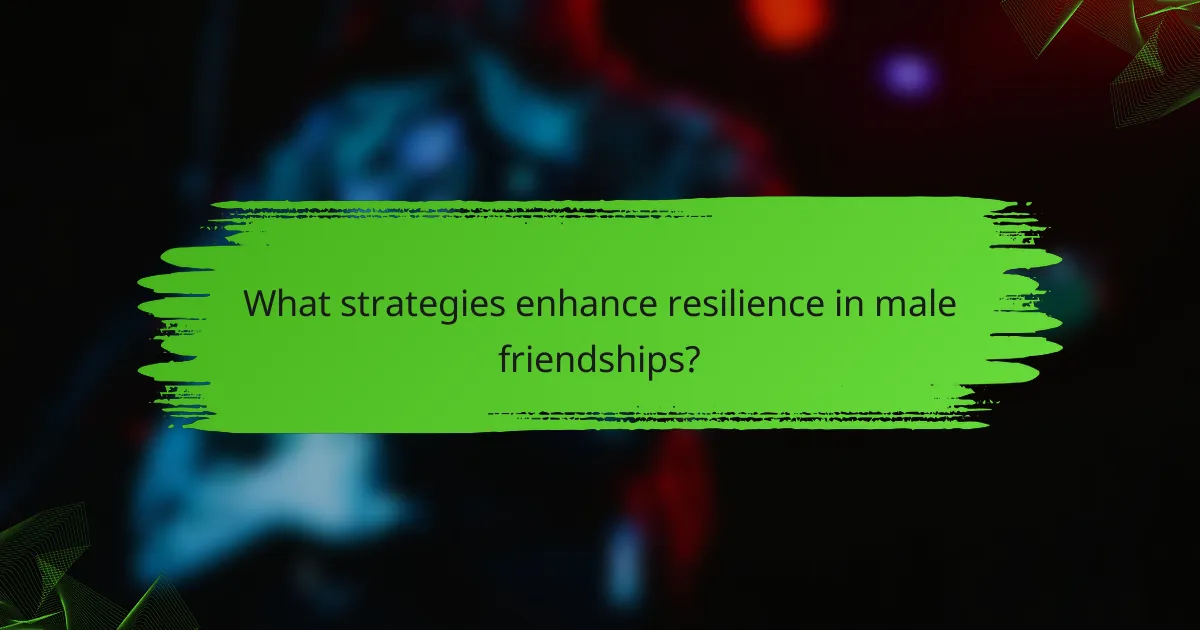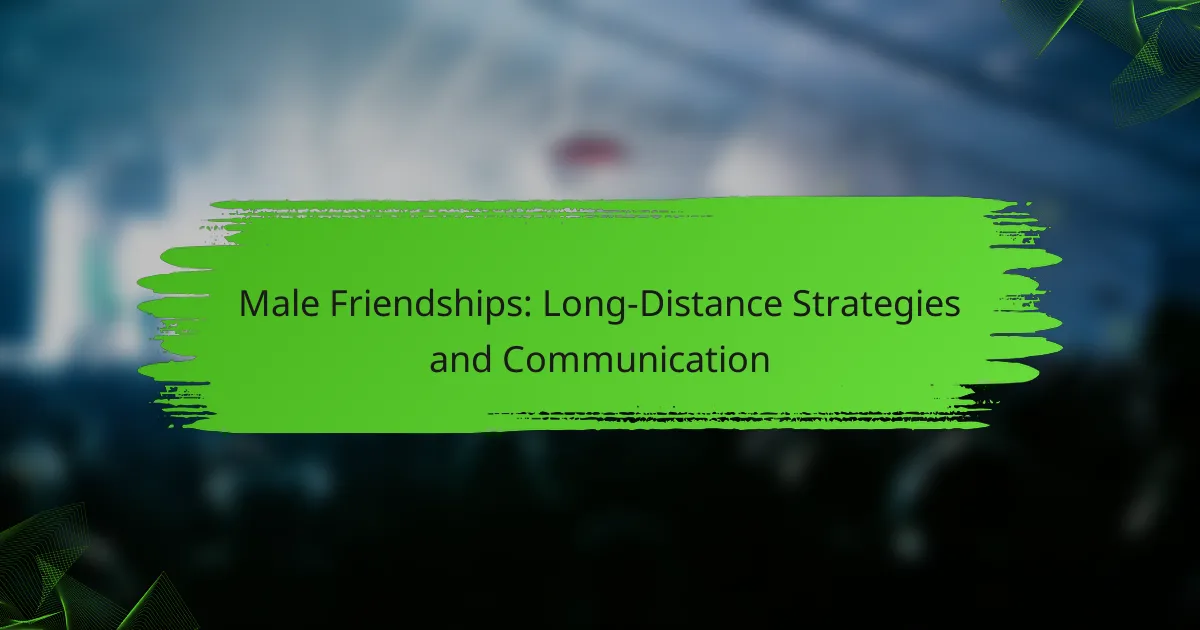Male friendships often face challenges during significant life changes, as shifting priorities and time constraints can alter relationship dynamics. To navigate these transitions successfully, men must cultivate resilience through open communication, shared activities, and emotional support. By embracing adaptability and understanding that friendships can evolve, they can strengthen their bonds and maintain meaningful connections over time.

How do life changes impact male friendships?
Life changes can significantly affect male friendships, often leading to shifts in priorities and available time. As men navigate various transitions, the dynamics of their relationships may evolve, requiring adaptation and resilience to maintain connections.
Career transitions
Career transitions, such as promotions or job changes, can alter the time and energy men have for friendships. New responsibilities may lead to longer hours or increased stress, making it challenging to stay connected with friends.
To manage these changes, it’s important to communicate openly with friends about time constraints. Scheduling regular catch-ups, even if brief, can help maintain bonds during busy periods.
Marriage and family
Marriage and starting a family often shift priorities, which can impact friendships. New commitments may lead to less availability for social activities, causing some friendships to fade if not actively nurtured.
Men should strive to include friends in their new life stages, such as inviting them to family gatherings or sharing parenting experiences. This inclusion can strengthen bonds and help friends adapt to the changes together.
Relocation
Relocating for work or personal reasons can disrupt established friendships. Distance can make regular interactions difficult, and new environments may not provide immediate opportunities to form new connections.
To counteract this, men can leverage technology for virtual hangouts and make an effort to meet up with friends during visits. Joining local clubs or groups can also facilitate new friendships in the new area.
Health issues
Health issues can strain friendships, as they may limit social activities or require significant emotional support. Friends may feel unsure about how to help or may unintentionally distance themselves due to discomfort.
Open communication is crucial; discussing needs and feelings can foster understanding. Friends should be encouraged to check in regularly and offer support in practical ways, such as accompanying each other to appointments or engaging in low-key activities.
Loss of a friend
Experiencing the loss of a friend can profoundly impact emotional well-being and social circles. Grieving can lead to withdrawal from other friendships, as men may struggle to cope with their feelings.
It’s important to seek support from remaining friends and to allow time for healing. Participating in group activities or support networks can also help men reconnect and build resilience after such a loss.

What strategies enhance resilience in male friendships?
Enhancing resilience in male friendships involves fostering open communication, engaging in shared activities, providing emotional support, and maintaining regular check-ins. These strategies help friends adapt to life changes and strengthen their bonds over time.
Open communication
Open communication is crucial for building resilience in male friendships. It allows friends to express their thoughts and feelings honestly, which can prevent misunderstandings and build trust. Regularly sharing experiences and concerns can deepen connections and promote a supportive environment.
To encourage open dialogue, consider setting aside time for candid conversations. This could be during a casual meet-up or a dedicated phone call. Avoid distractions and focus on listening actively to each other.
Shared activities
Engaging in shared activities can significantly enhance resilience in male friendships. Whether it’s playing sports, hiking, or participating in a hobby together, these experiences create lasting memories and strengthen bonds. Shared interests can also provide a sense of belonging and teamwork.
Try to schedule regular outings or activities that both friends enjoy. This could be as simple as a weekly game night or monthly outdoor adventures. The key is consistency and mutual enjoyment.
Emotional support
Providing emotional support is essential for resilience in male friendships. Friends should feel comfortable offering and receiving encouragement during tough times. This support can manifest as listening without judgment, offering advice when asked, or simply being present.
To foster emotional support, be proactive in checking in on each other during challenging periods. A simple text or call can show that you care and are there for your friend, reinforcing the bond between you.
Regular check-ins
Regular check-ins help maintain the health of male friendships and enhance resilience. These check-ins can be brief but should focus on how each person is doing emotionally and mentally. Consistent communication can prevent feelings of isolation and strengthen the friendship over time.
Consider setting a routine for check-ins, such as a weekly phone call or a monthly coffee meet-up. This creates a reliable structure that encourages both friends to stay connected and engaged in each other’s lives.

How can men adapt to changing friendship dynamics?
Men can adapt to changing friendship dynamics by being open to new experiences and understanding that friendships may evolve over time. This requires a willingness to communicate openly and adjust expectations as life circumstances shift.
Embrace vulnerability
Embracing vulnerability is crucial for deepening male friendships. Sharing personal thoughts and feelings can foster trust and connection, making it easier to navigate changes together. For example, discussing challenges like job loss or relationship issues can strengthen bonds.
To practice vulnerability, start small by sharing a personal story or expressing feelings about a recent event. This can create a safe space for others to open up in return, enhancing mutual support.
Set realistic expectations
Setting realistic expectations helps manage the ups and downs of friendships. Understand that life changes, such as moving for a job or starting a family, may limit availability for social interactions. Acknowledging these shifts can reduce disappointment and foster patience.
Consider scheduling regular check-ins, even if they are brief, to maintain connections. This can be as simple as a quick phone call or a text message to show you care, ensuring that friendships remain strong despite busy lives.
Prioritize quality over quantity
Focusing on quality rather than quantity in friendships can lead to more meaningful connections. It’s better to have a few close friends who understand and support you than to maintain a large group of acquaintances. Quality friendships often provide deeper emotional support and understanding.
Evaluate your friendships by considering who you feel comfortable confiding in and who consistently supports you. Nurturing these key relationships can lead to greater resilience during life changes.

What role does social media play in male friendships?
Social media significantly influences male friendships by facilitating communication and connection, especially in busy lifestyles. It allows men to maintain relationships over distances and share experiences in real-time, enhancing their social bonds.
Connection maintenance
Social media platforms enable men to stay connected with friends, even when they are physically apart. Regular interactions through messaging apps, social networks, and video calls help sustain friendships, making it easier to share life updates and support each other.
For effective connection maintenance, men should aim to engage consistently, whether through quick messages or scheduled video chats. Setting reminders to check in can help avoid long gaps in communication.
Conflict resolution
When conflicts arise, social media can provide a platform for resolution, though it requires careful handling. Text-based communication can sometimes lead to misunderstandings, so it’s crucial to approach sensitive topics thoughtfully and consider moving to a face-to-face conversation when necessary.
To resolve conflicts effectively, men should focus on clear and respectful communication, using direct messages to express feelings without escalating tensions. Avoiding public discussions of personal issues can also prevent further complications.
Group interactions
Social media enhances group interactions by allowing men to coordinate activities, share interests, and engage in group chats. Platforms like Facebook or WhatsApp facilitate planning events, sharing hobbies, and maintaining a sense of community among friends.
To optimize group interactions, men should create dedicated group chats for specific interests or activities. Regularly sharing updates or organizing virtual hangouts can keep the group engaged and strengthen bonds among members.

How do cultural factors influence male friendships?
Cultural factors significantly shape male friendships by dictating social norms, communication styles, and expectations. These influences can vary widely across different regions, generations, and societal contexts, impacting how men form and maintain their friendships.
Regional differences
Regional differences play a crucial role in male friendships, as cultural backgrounds influence social interactions. For instance, in Mediterranean cultures, friendships often involve close-knit social gatherings and emotional expressiveness, while in Northern European cultures, friendships may prioritize personal space and independence.
Understanding these regional nuances can help men navigate friendships more effectively. For example, a man from a collectivist culture might expect a more communal approach to friendship, while someone from an individualistic culture may value autonomy and self-reliance in their relationships.
Generational perspectives
Generational perspectives significantly affect how male friendships are formed and maintained. Younger generations, such as Millennials and Gen Z, often utilize technology and social media to foster connections, leading to more diverse and expansive friendship networks. In contrast, older generations may rely more on face-to-face interactions and long-standing relationships.
This shift highlights the importance of adapting to new methods of communication. Men should consider embracing digital platforms while also valuing traditional forms of connection to maintain a balanced approach to friendships across generations.
Societal expectations
Societal expectations can heavily influence male friendships, often imposing norms around masculinity that dictate how men should interact. Many cultures promote ideals of stoicism and emotional restraint, which can hinder open communication and vulnerability among friends.
To counteract these pressures, men can work on fostering emotional intelligence and encouraging supportive dialogue within their friendships. Creating safe spaces for sharing feelings can help break down barriers and strengthen bonds, allowing for more meaningful connections.



